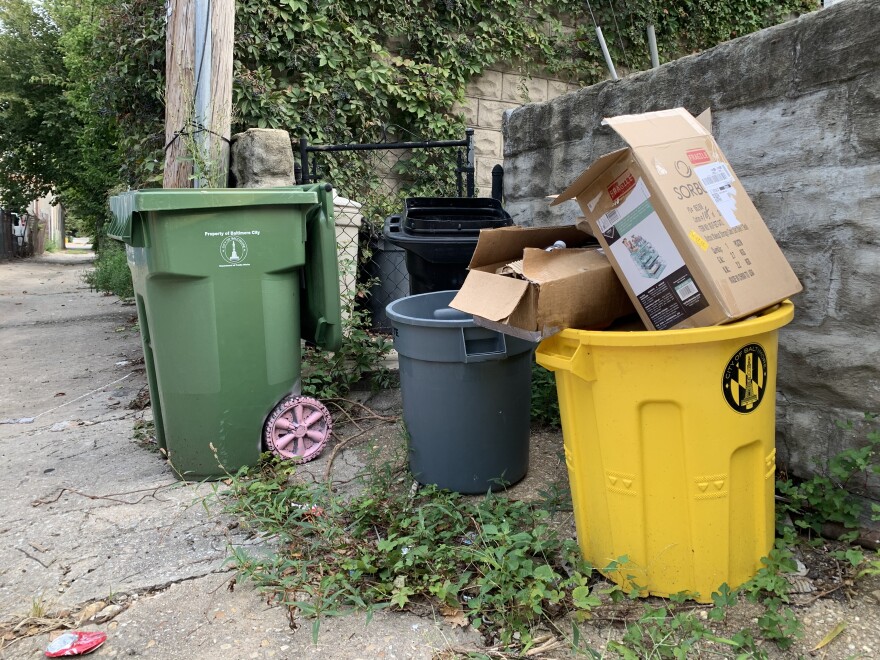Baltimore City Department of Public Works officials told city council members Tuesday that more than a third of their trash and recycling crews didn’t work in August because of the coronavirus pandemic, allowing some neighborhoods to go weeks without pick-ups.
“We have been hit on all sides by COVID,” John Chalmers, Head of DPW’s Bureau of Solid Waste, said in a hearing before the Housing and Urban Affairs Committee.
The agency has had to close sanitation yards and quarantine workers as outbreaks occur. They’ve dealt with larger than usual trash tonnage as people spend more time in their homes. And they’ve struggled to both retain and attract workers.
The nature of trash pickup work – with its physical demands and exposure to the elements – requires a special kind of worker that DPW can’t find during the pandemic, Chalmers said, recalling a recent hiring experience. The agency hired an employee who started last week. He showed up for the first day, failed to show up for the second and worked four hours on the third day, before quitting.
“The challenges of this type of work have been exacerbated under the pent-up anxiety and the demands of working with masks on,” Chalmers said, especially during the recent summer heat.
The agency dealt with its reduced workforce by suspending recycling pickup services in August and assigning all recycling crews to trash routes in an attempt to catch up with a growing backlog of missed routes. Matthew Garbark, acting DPW director, said that decision was made from a public health standpoint.
“We wanted to prioritize trash collections because there is a very clear public health and safety ramification from trash that is uncollected,” Garbark said. “But we also knew that we need to continue to emphasize waste diversion and recycling and keep an option available.”
So DPW opened 14 community recycling dropoff centers across Baltimore in late August. After studying two weeks worth of data from each center, Garbark said, DPW moved two locations, and added another altogether. The agency also extended dropoff center hours on Tuesdays and Thursdays, to 7:00 a.m. to 6:00 p.m.
DPW is also trying to secure contractors to help reduce the number of missed trash pickups. But, Chalmers said, there’s been little interest and that it’s hard to find companies with the right vehicles to navigate narrow Baltimore alleys.
“We service 210,000 households Tuesday through Friday,” Chalmer said. “And you just can't have a pick up truck or an open body truck and go through the alley and start throwing trash on a truck.”
In order to boost DPW’s workforce and return trash and recycling services to normal, Councilman Isaac ‘Yitzy’ Schleifer suggested higher wages. Temporary crew workers earn $11 an hour, while permanent employees start at $16.
“By no stretch of the imagination should these folks be paid that little,” Schleifer said. “$11 an hour is a complete joke.”
There’s no reason the city can’t bump both temporary and permanent employee wages by $4 an hour, the North Baltimore Democrat said.
“This is not a $16-an-hour job, working behind a smelly truck, putting in 10 hour days in 100 degree heat or 0 degree snow days,” Schleifer said. “And I think that if we made those adjustments, what we'd see is that in the long term, we'd actually be saving money.”
That’d happen thanks to reduced turnover and less frequent training sessions, he said. Ultimately, any pay change would be negotiated between the agency and its employees’ union, the American Federation of State, County & Municipal Employees.
Garbark said they will try to continue to recruit new workers to help them with the onslaught of trash, starting with a virtual job fair at 1:00 p.m. Wednesday on Facebook.





